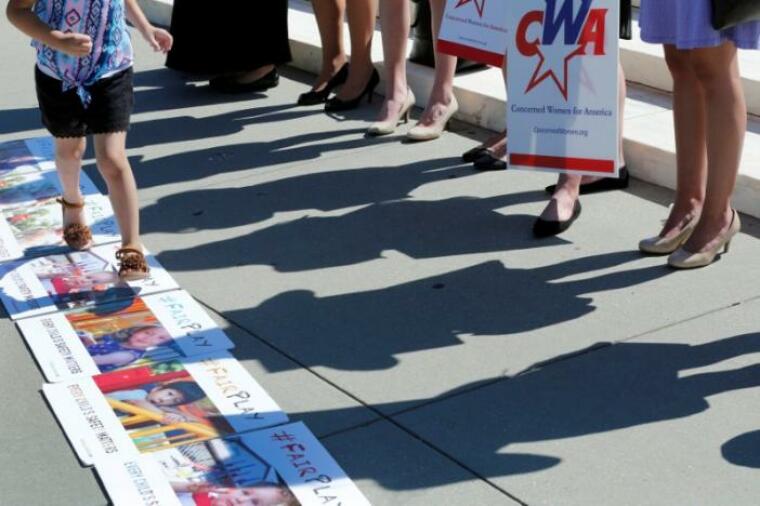Missouri church wins Supreme Court case over public funding

The U.S. Supreme Court has ruled in favor of a Missouri church that filed a discrimination claim after the state denied its application for a grant program to improve its playground.
In a 7–2 vote delivered on Monday, the court ruled that Trinity Lutheran Church in Columbia had been treated unfairly by the state under the First Amendment's free exercise clause, Religion News Service reported.
In the majority opinion, Chief Justice John Roberts wrote that the state had wrongly denied the "an otherwise available public benefit on account of its religious status."
"This Court has repeatedly confirmed that denying a generally available benefit solely on account of religious identity imposes a penalty on the free exercise of religion," Roberts added.
The case began in 2012 when Trinity Lutheran applied for a state grant program that provides scrap tires to nonprofits in an effort to make playgrounds safer. According to The Stream, the church runs a preschool that has a playground that is open to children in the community.
The state denied the church's application, citing a state law that said religious organizations are not allowed to receive state funding.
Trinity Lutheran argued that the state violated the free exercise clause of the First Amendment by denying the application to the grant program just because the preschool was associated with the church.
The Missouri Department of Natural Resources, on the other hand, cited the establishment clause of the First Amendment to defend its decision not to provide aid directly to a church, even if the funds are used for a secular purpose.
Missouri law prevents state funds from going "directly or indirectly, in aid of any church, sect, or denomination of religion."
In April, Missouri Gov. Eric Greitens reversed the policy, just a week before the case went before the Supreme Court.
Some wondered whether Greitens move would render the case moot, but both Missouri's Attorney General and Alliance Defending Freedom (ADF), which represented Trinity Lutheran, asked for the case to move forward.
ADF's Kerri Kupec maintained that the issue was about a church's right to "public safety benefit program."
"We wouldn't say to a yeshiva or mosque or a parochial school or a temple that they can't call the fire department," she stated at the time.
The case has been seen by many court watchers to be the highest profile of the Supreme Court season, which runs from October through early summer. The court's decision has been celebrated by conservative advocates for religious freedom.
"The decision today affirms that commonsense principle and the larger truth that government isn't being neutral when it treats religious organizations worse than everyone else," said ADF Senior Counsel David Cortman.
 Christians don't have to affirm transgenderism, but they can’t express that view at work: tribunal
Christians don't have to affirm transgenderism, but they can’t express that view at work: tribunal Archaeology discovery: Medieval Christian prayer beads found on Holy Island
Archaeology discovery: Medieval Christian prayer beads found on Holy Island Presbyterian Church in America votes to leave National Association of Evangelicals
Presbyterian Church in America votes to leave National Association of Evangelicals Over 50 killed in 'vile and satanic' attack at Nigerian church on Pentecost Sunday
Over 50 killed in 'vile and satanic' attack at Nigerian church on Pentecost Sunday Ukrainian Orthodox Church severs ties with Moscow over Patriarch Kirill's support for Putin's war
Ukrainian Orthodox Church severs ties with Moscow over Patriarch Kirill's support for Putin's war Islamic State kills 20 Nigerian Christians as revenge for US airstrike
Islamic State kills 20 Nigerian Christians as revenge for US airstrike Man who served 33 years in prison for murder leads inmates to Christ
Man who served 33 years in prison for murder leads inmates to Christ


 Nigerian student beaten to death, body burned over ‘blasphemous’ WhatsApp message
Nigerian student beaten to death, body burned over ‘blasphemous’ WhatsApp message 'A new low': World reacts after Hong Kong arrests 90-year-old Cardinal Joseph Zen
'A new low': World reacts after Hong Kong arrests 90-year-old Cardinal Joseph Zen Iran sentences Christian man to 10 years in prison for hosting house church worship gathering
Iran sentences Christian man to 10 years in prison for hosting house church worship gathering French Guyana: Pastor shot dead, church set on fire after meeting delegation of Evangelicals
French Guyana: Pastor shot dead, church set on fire after meeting delegation of Evangelicals ‘Talking Jesus’ report finds only 6% of UK adults identify as practicing Christians
‘Talking Jesus’ report finds only 6% of UK adults identify as practicing Christians Mission Eurasia ministry center blown up in Ukraine, hundreds of Bibles destroyed: 'God will provide'
Mission Eurasia ministry center blown up in Ukraine, hundreds of Bibles destroyed: 'God will provide' Church holds service for first time after ISIS desecrated it 8 years ago
Church holds service for first time after ISIS desecrated it 8 years ago Burger King apologizes for 'offensive campaign' using Jesus' words at the Last Supper
Burger King apologizes for 'offensive campaign' using Jesus' words at the Last Supper Uganda: Muslims abduct teacher, burn him inside mosque for praying in Christ’s name
Uganda: Muslims abduct teacher, burn him inside mosque for praying in Christ’s name